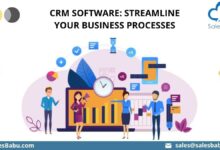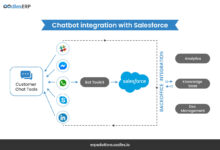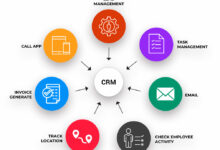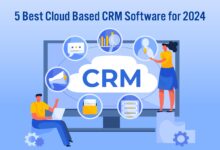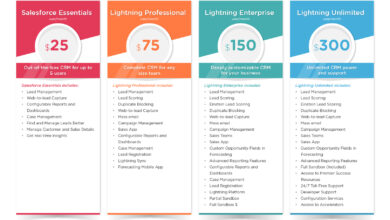Affordable CRM Software For Startups: Efficient Solutions For Growing Businesses
Affordable CRM Software for Startups introduces cost-effective solutions tailored for emerging businesses, highlighting key features and benefits to streamline operations and drive growth.
The discussion delves into various aspects such as customization, integration capabilities, user-friendly interfaces, customer support, data security, mobile accessibility, reporting, analytics, and success stories of startups leveraging CRM software.
Overview of Affordable CRM Software for Startups
CRM software is essential for startups as it helps them efficiently manage customer relationships, track sales, and improve overall business operations. By utilizing CRM software, startups can streamline processes, increase productivity, and enhance customer satisfaction.
Key Features of Affordable CRM Software for Startups
- Customizable Dashboards: Affordable CRM software for startups often offers customizable dashboards that allow users to tailor the interface according to their specific needs and preferences.
- Contact Management: Startups can efficiently store and manage customer contact information, interactions, and communication history in one centralized platform.
- Sales Automation: CRM software automates sales processes, such as lead tracking, email campaigns, and follow-ups, enabling startups to prioritize and nurture leads effectively.
- Reporting and Analytics: Affordable CRM software provides startups with valuable insights through reporting and analytics tools, helping them make data-driven decisions to drive business growth.
- Integration Capabilities: CRM software can integrate with other essential tools and applications used by startups, such as email marketing platforms, accounting software, and e-commerce platforms.
Benefits of Using CRM Software Specifically Designed for Startups
- Cost-Effective Solution: Affordable CRM software offers startups a cost-effective solution to manage customer relationships and sales processes without breaking the bank.
- Scalability: Startups can easily scale their CRM software as their business grows, ensuring that the software can adapt to their changing needs and requirements.
- Improved Efficiency: By centralizing customer data and automating processes, CRM software helps startups improve efficiency, reduce manual tasks, and optimize workflow.
- Enhanced Customer Relationships: CRM software allows startups to personalize interactions with customers, track customer preferences, and provide better customer service, ultimately leading to increased customer satisfaction and loyalty.
Cost-effective CRM Solutions
When looking for CRM software solutions that are budget-friendly for startups, it’s important to compare different options available and find the best fit for your business needs. Here are some affordable CRM software packages suitable for startups and tips on how to save costs when implementing CRM solutions:
Budget-Friendly CRM Software Options
- Zoho CRM: Zoho offers a free version for up to 3 users, making it a great choice for startups on a tight budget. The paid plans are also affordable and scalable as your business grows.
- HubSpot CRM: HubSpot provides a free CRM with basic features that can be upgraded with additional tools as needed. It’s user-friendly and ideal for startups looking to streamline their sales processes.
- Pipedrive: Pipedrive offers a user-friendly interface and customizable features at a competitive price point. It’s a good option for startups focused on sales pipeline management.
Tips to Save Costs on CRM Implementation
- Start with a Free Trial: Many CRM software providers offer free trials, allowing you to test the platform before committing to a paid plan.
- Focus on Essential Features: Identify the key features your startup needs in a CRM system and avoid paying for unnecessary add-ons or modules.
- Consider Scalability: Choose a CRM solution that can grow with your business to avoid the need for costly migrations in the future.
- Training and Support: Invest in training for your team to maximize the use of the CRM software and reduce the risk of errors or inefficiencies.
Customization and Scalability
Customization and scalability are crucial aspects of CRM software for startups as they allow businesses to tailor the system to their specific needs and ensure that it can grow along with their operations.
Importance of Customizable Features
Customizable features in CRM software enable startups to personalize the system according to their unique requirements. This flexibility allows businesses to capture and analyze data that is most relevant to their operations, improving efficiency and productivity.
- Startups can customize fields within the CRM to track specific customer information that is essential to their business, such as preferences, purchase history, or communication history.
- By customizing workflows and automations, startups can streamline processes and ensure that tasks are completed in a timely manner, enhancing customer satisfaction and retention.
- Customizable reporting and analytics features enable startups to generate insights that are tailored to their business goals, helping them make informed decisions and drive growth.
Scalable CRM Solutions
Scalability in CRM software is vital for startups as it allows the system to expand and accommodate the growing needs of the business. A scalable CRM solution can adapt to increasing data volumes, user numbers, and functionality requirements.
- Startups can start with a basic CRM system and easily add more advanced features or modules as their business grows, without the need to switch to a completely new platform.
- Scalable CRM solutions can integrate with other business tools and technologies, allowing startups to create a seamless ecosystem that supports their evolving operations.
- As startups expand into new markets or customer segments, a scalable CRM system can adjust to meet the changing demands and provide a consistent experience across all touchpoints.
Examples of Customization
Examples of how startups can tailor CRM software to meet their specific requirements include:
Customizing lead scoring criteria to prioritize high-value leads based on the business’s target customer profile and behavior.
Creating custom dashboards to visualize key performance indicators that are relevant to the startup’s unique goals and objectives.
Integrating third-party applications or APIs to extend the functionality of the CRM system and enhance the overall customer experience.
Integration Capabilities
Integration capabilities are crucial for CRM software used by startups as they allow seamless connectivity with other tools and systems, streamlining operations and enhancing productivity.
Key Integrations for Startups in CRM Software
- Communication Tools: Integration with email platforms like Gmail or Outlook for easy communication tracking.
- Marketing Automation: Connecting CRM with marketing automation tools for targeted campaigns and lead nurturing.
- Accounting Software: Integration with accounting software for accurate invoicing and financial data management.
- Social Media Platforms: Linking CRM with social media channels for customer engagement and insights.
Advantages of Integrated CRM System for Startups
- Improved Efficiency: Streamlining processes and data across different tools saves time and reduces manual work.
- Enhanced Customer Experience: Integrated CRM provides a holistic view of customers, enabling personalized interactions and better service.
- Data Accuracy: Integration ensures data consistency across systems, minimizing errors and improving decision-making.
- Scalability: Scalable integrations allow startups to add new tools as they grow without disrupting existing processes.
User-Friendly Interface
Having a user-friendly interface in CRM software is crucial for startups as it can significantly impact user adoption and engagement. A simple and intuitive interface not only makes it easier for employees to navigate the system but also increases productivity and efficiency within the organization.
Examples of Intuitive CRM Interfaces
- Salesforce: Known for its clean and organized layout, Salesforce offers customizable dashboards and easy-to-use features that make it ideal for startups.
- HubSpot CRM: With its user-friendly design and straightforward navigation, HubSpot CRM is a popular choice among startups looking for an intuitive CRM solution.
Tips for Ensuring User Adoption and Engagement
- Provide thorough training: Invest time in training employees on how to use the CRM software effectively to boost user adoption.
- Solicit feedback: Encourage users to provide feedback on the interface to make necessary improvements and enhance user engagement.
- Customize user experience: Tailor the CRM interface to meet the specific needs and preferences of your startup team for better user engagement.
Customer Support and Training
Customer support and training play a crucial role in ensuring the successful implementation of CRM software for startups. Let’s delve into the importance of these aspects and best practices for startups to leverage them effectively.
Role of Customer Support
Customer support serves as a lifeline for startups navigating the complexities of CRM software. It provides assistance in resolving issues, answering queries, and offering guidance throughout the implementation process. The availability of reliable customer support can significantly impact the overall user experience and satisfaction.
Training Resources for Startups
Training resources offered by CRM software vendors are invaluable for startups looking to optimize their usage of the platform. These resources may include online tutorials, webinars, documentation, and personalized training sessions. By investing time in training, startups can empower their teams to maximize the benefits of CRM software and enhance productivity.
Best Practices for Leveraging Customer Support and Training
- Proactively engage with customer support: Encourage your team to reach out to customer support whenever they encounter challenges or have questions about the CRM software.
- Utilize training resources effectively: Make sure to take advantage of all available training materials to enhance your understanding of the software and improve user proficiency.
- Establish internal training processes: Create a structured training program within your startup to onboard new employees and continuously educate existing team members on CRM best practices.
- Seek feedback and iterate: Encourage feedback from your team regarding the effectiveness of the CRM software and the training received. Use this feedback to iterate and refine your processes for better results.
Data Security and Compliance
In today’s digital age, data security and compliance are crucial aspects that startups need to consider when choosing a CRM software. Ensuring the protection of sensitive customer information and adhering to data protection regulations is essential for building trust with customers and avoiding potential legal issues.
Security Measures to Look for in CRM Solutions
- Encrypted Data Transmission: Look for CRM software that offers encrypted data transmission to protect information as it travels between devices and servers.
- Role-Based Access Control: Ensure that the CRM solution provides role-based access control, allowing startups to control who has access to sensitive data within the organization.
- Regular Data Backups: Choose a CRM software that automatically backs up data regularly to prevent loss in case of system failures or cyber attacks.
- Two-Factor Authentication: Opt for CRM solutions that offer two-factor authentication to add an extra layer of security when logging in.
Ensuring Compliance with Data Protection Regulations
- Understand Regulations: Startups should familiarize themselves with data protection regulations such as GDPR, CCPA, or HIPAA, depending on their location and industry.
- Privacy Policies: Ensure that the CRM software aligns with the startup’s privacy policies and provides features to help comply with regulations regarding data privacy.
- Data Minimization: Implement practices within the CRM system to only collect and retain necessary customer data to comply with regulations that require data minimization.
- Regular Audits: Conduct regular audits of the CRM software and data handling processes to ensure compliance with regulations and identify areas for improvement.
Mobile Accessibility
Mobile accessibility in CRM software for startups is crucial in today’s fast-paced business environment. With the increasing trend of remote work and on-the-go operations, having the ability to access CRM systems from mobile devices ensures that startups can stay connected and productive at all times.
Benefits of Mobile Accessibility
- Flexibility: Mobile access allows employees to manage customer relationships, update data, and track sales activities from anywhere, at any time.
- Real-time Updates: With mobile accessibility, employees can instantly view and update customer information, ensuring that everyone is on the same page and has access to the latest data.
- Improved Efficiency: Mobile CRM applications streamline processes and enable quick responses to customer inquiries, leading to improved productivity and customer satisfaction.
CRM Software with Robust Mobile Applications
- HubSpot CRM: HubSpot offers a user-friendly mobile app that provides access to essential CRM features, such as contact management and deal tracking, on the go.
- Zoho CRM: Zoho CRM’s mobile app allows users to access customer data, collaborate with team members, and manage sales activities from their smartphones or tablets.
- Salesforce Mobile: Salesforce offers a mobile app that provides a comprehensive view of customer information, enabling users to manage leads, opportunities, and customer interactions from anywhere.
Enhancing Productivity with Mobile Access
Mobile access to CRM systems can enhance productivity for startups by enabling employees to:
- Respond to customer inquiries promptly, even when away from the office.
- Access real-time data and updates to make informed decisions on the go.
- Collaborate with team members and share information seamlessly, improving teamwork and efficiency.
Reporting and Analytics
Reporting and analytics features in CRM software are crucial for startups as they provide valuable insights into customer behavior, sales performance, and overall business operations. By analyzing data collected within the CRM system, startups can make informed decisions, identify trends, and optimize their strategies for growth.
Key Metrics for Startups to Track using CRM Analytics
- Customer Acquisition Cost (CAC): Measure how much it costs to acquire a new customer, helping startups evaluate the effectiveness of their marketing and sales efforts.
- Customer Lifetime Value (CLV): Determine the value a customer brings to the business over their entire relationship, assisting startups in focusing on high-value customers.
- Sales Pipeline Velocity: Track the speed at which leads move through the sales pipeline, enabling startups to forecast revenue and identify bottlenecks.
- Customer Churn Rate: Monitor the rate at which customers stop using the product or service, allowing startups to implement retention strategies.
Data-Driven Insights for Informed Decisions
CRM software provides startups with data-driven insights that can help them make informed decisions. By analyzing customer interactions, sales trends, and marketing campaigns, startups can identify areas for improvement, optimize processes, and personalize customer experiences. These insights enable startups to react quickly to market changes, anticipate customer needs, and stay ahead of the competition.
Customer Success Stories
Customer success stories are a great way to showcase the real-world benefits of using affordable CRM software for startups. These stories highlight the specific challenges that startups faced and how CRM solutions helped them overcome those obstacles, leading to positive outcomes and growth.
Startup A: Streamlining Sales Process
Startup A, a small e-commerce business, was struggling to keep track of customer interactions and manage their sales pipeline effectively. By implementing an affordable CRM software tailored to their needs, they were able to streamline their sales process, automate repetitive tasks, and provide personalized customer experiences. As a result, Startup A saw a significant increase in sales revenue and customer satisfaction.
Startup B: Improving Customer Retention
Startup B, a SaaS company, was facing challenges in retaining customers and reducing churn rates. With the help of a cost-effective CRM solution, they were able to segment their customer base, analyze customer behavior, and implement targeted marketing campaigns. This proactive approach led to improved customer retention, increased customer loyalty, and ultimately, sustainable business growth.
Startup C: Enhancing Customer Support
Startup C, a tech startup, was struggling to provide efficient customer support due to a lack of centralized information and communication channels. By integrating a CRM system with their support operations, they were able to track customer inquiries, prioritize tickets, and deliver timely resolutions. This resulted in higher customer satisfaction rates, improved response times, and a more streamlined support process.
Final Review
In conclusion, Affordable CRM Software for Startups offers a comprehensive guide for businesses looking to optimize their CRM strategies, emphasizing the importance of tailored solutions to foster success in a competitive market landscape.

